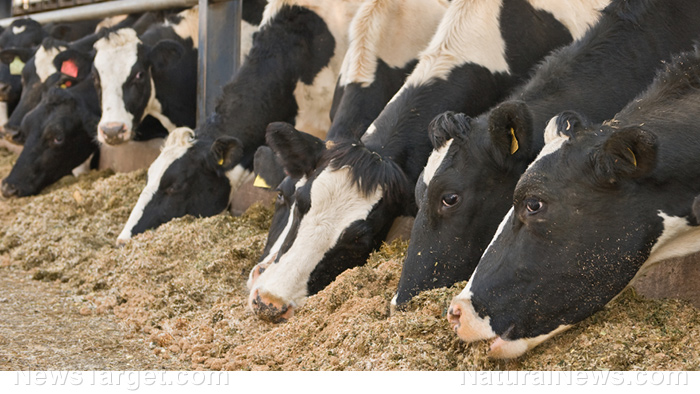Bill Gates wants to use AI for genetically modifying beef cows to “save the planet”
04/23/2024 / By Cassie B.

Microsoft founder Bill Gates recently discussed how AI could fight climate change on his podcast, Unconfuse Me With Bill Gates, and it was just the type of unhinged conversation you would expect from the same man who touts synthetic beef, depopulation, preventing cows from burping and experimental geoengineering.
He made his latest remarks in an interview with data scientist Hannah Ritchie. When their conversation turned to artificial intelligence and its potential utility in addressing environmental issues, he shared his surprise at how quickly the technology has been advancing.
“I was very stunned how the AIs went from basically not being able to read or write at all, to doing that in a very facile way,” he told her.
When asked if he thought AI could play a role in taking action on the climate, he answered, “Absolutely.” He then cited the example of genetically modifying beef cattle with AI so that they produce less methane, or using AI to somehow produce “meat without the cow.”
Ritchie pointed out that people are not embracing the idea of meat alternatives, and that’s something Gates is also quite familiar with as he has invested in multiple companies that produce fake meats, such as Impossible Foods, Upside Foods and Beyond Meat.
He has said in the past that “all rich countries should move to 100% synthetic beef” and that he is optimistic fake meats products will be a “very good” alternative for consumers as many people are reluctant to cut meat out of their diets.
Last November, Beyond Meat cut nearly 20 percent of its non-production workforce following plummeting sales as customers eschew the highly processed and unhealthy concoction. Once heavily hyped, its stock has fallen more than 60 percent, and an opinion piece in the New York Times recently referred to lab-grown meat as “the revolution that died on its way to dinner.” Some assessments have revealed that such products don’t offer much in the way of environmental benefits and may even be causing more harm than good.
Gates is also going after cow burps, investing in an Australian startup that is focused on preventing cows from burping methane emissions by feeding them a dietary supplement with a synthetic version of an ingredient in red seaweed that prohibits methane formation.
A spokesperson for Breakthrough Energy Ventures, Gates’ investment fund, said: “Although cows are a significant [greenhouse gas] source, livestock agriculture remains one of the cheapest protein sources globally, which means technologies that can reduce emissions from the existing cattle supply chain today and in the future are critical.”
Gates is overlooking the impact of AI on the environment
Gates may have a lot of ideas about dealing with cows, but does he really have the environment’s best interests at heart? He said that he sees AI as potentially being useful in modifying cows, but what about the impact that AI is having on the climate?
If carbon really is as bad as he claims, shouldn’t he be concerned about the large carbon footprint involved in developing, maintaining and disposing of AI technology? The emissions from the IT technology industry as a whole are expected to account for 14 percent of global emissions by 2040, especially the data centers involved in AI, while training AI models is said to produce 626,000 pounds of carbon dioxide, which is equal to around 300 round-trip flights across the U.S.
Of course, placing all the blame for the planet’s woes on cows and glossing over the negative impact of AI on the environment makes a lot more sense when you consider his sizeable financial investments in meat alternatives and OpenAI.
Sources for this article include:
Submit a correction >>
Tagged Under:
absurd, AI, bill gates, biotech, climate change, cows, cyborg, Food Evolution, food science, food supply, frakenfood, future science, future tech, glitch, imbecile, insanity, inventions, lunatics, Methane emissions, robotics, robots, technocrats
This article may contain statements that reflect the opinion of the author
RECENT NEWS & ARTICLES
COPYRIGHT © 2018 PSYCHO.NEWS
All content posted on this site is protected under Free Speech. Psycho.news is not responsible for content written by contributing authors. The information on this site is provided for educational and entertainment purposes only. It is not intended as a substitute for professional advice of any kind. Psycho.news assumes no responsibility for the use or misuse of this material. All trademarks, registered trademarks and service marks mentioned on this site are the property of their respective owners.




















